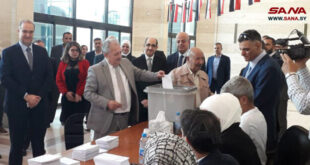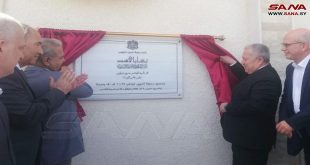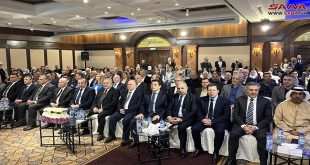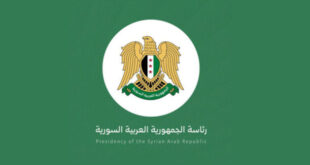Damascus, SANA – The Syrian government fully supports the residents of the border city of Ayn al-Arab, also known as Kobane, and applauds them for their “heroic” confrontation of the onslaught launched against them by members of the terrorist organization of the Islamic State of Iraq and Syria (ISIS) that seeks to seize control of the city.
Addressing the People’s Assembly in a session held with the attendance of all ministers, al-Halqi said “The government condemns in the strongest terms the French President’s attitude on backing Turkey’s effort for setting up a buffer zone [along the border with Syria] as it contravenes the UN Charter and the Security Council’s resolutions on counterterrorism.”
He doubted the intentions of the recently formed US-led international alliance to combat ISIS when it “coordinates with those who call themselves ‘moderate opposition’ that has been practicing acts of killing against the Syrians,” questioning also the alliance’s “desire for a political solution in Syria.”
The Syrian government will continue combating terrorism wherever it is on the Syrian land, with this issue being the top priority to provide a secure and stable environment for civilians and ensure the return of those displaced to their home areas, said al-Halqi.
While stressing that “Syria will go ahead firmly with its war against takfiri terrorism in all its forms,” al-Halqi said, Syria supports any “sincere” international effort for countering terrorism provided that any such effort is carried out in the framework of protecting the lives of civilians and respecting the country’s national sovereignty in accordance with the international conventions, particularly the Security Council’s resolutions 2170 and 2178.
Fighting terrorism, he made clear, demands bringing to a halt all forms of support to the terrorist organizations and coordinating with the countries concerned, including Syria.
While indicating the increasing scale of the challenge facing the Syrian state at the security, political, economic, social and development levels with the crisis is well into its fourth year, the Premier stressed that the government is working on devising solutions to address the growing challenge.
Part of this effort, he noted, is to continue employing emergency approaches that suit any given situation and are in line with the strategic plans aimed at consolidating the country’s steadfastness.
The Premier pointed to two tracks on which the government works to constantly boost the steadfastness; one is to secure the basic needs for the citizens’ livelihood and ensure all the requirements for the armed and security forces to go on with strongly fighting terrorism.
The other track, he added, has to do with the optimal investing of the points of strength of the state and society in a way that bolsters the links among the security, social and economic goals to give boost to the state of recovery and pushes the wheel of economy and reconstruction forward.
In parallel with those efforts, al-Halqi said, the government will continue the track of national reconciliations and keep sight of the issue of the missing, abductees and detainees to have their issues tackled.
For their part, the Assembly members called for boosting security precautions to prevent terrorist attacks, bring those responsible for the terrorist bombings which targeted schools in Homs to justice, supporting the people of Ayn al-Arab, and pressuring the world’s parliaments to condemn the heinous crimes committed against Syrian Kurds in Ayn al-Arab at the hands of ISIS.
Some of the members stressed the need to curb corruption, monitor market prices, review the status of some of the licensed parties, address the government’s recent decision to raise fuel prices, and provide support for farmers, while others called for seizing the properties of states and individuals who are complicit in shedding Syrian blood and supporting terrorists, and addressing the needs of the people of Aleppo province.
They also addressed some issues related to the environment, unregulated housing areas, and higher education.
Premier al-Hlaqi responded to some of the issues raised by the Assembly members, saying that the Economy and Foreign Trade Ministry is working to build a database of businessmen who require funding for imports, noting that 160 industrial facilities in Shekh Najjar industrial city have returned to work, adding that Hassia industrial city is working at 68% efficiency and facilities in Yabroud industrial zone are also returning to work.
The Assembly referred a bill on amending some articles of the social securities law, a bill on establishing a forensic medicine department, and a bill on regulating the issuing of travel documents and passports to the relevant committees for study.
The session was adjourned until noon on Monday.
Haifa Said / Hazem Sabbagh
 Syrian Arab News Agency S A N A
Syrian Arab News Agency S A N A




